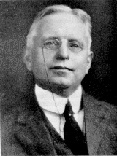| By Larry Lund Member of the Ely Chapter LAI International Fellow LAI International President 2003-2005 Ely Chapter President 1991 |
 Richard T. Ely (1854-1943) |
Come celebrate the Land Economics Weekend (LEW) in April 26-28, 2018 in Baltimore, Maryland. Baltimore is where we held the first LEW in 2000, where our “founder” Richard T. Ely launched his career, and where we will continue to celebrate the 25th Anniversary of the Baltimore Chapter!
Initially, the LEWs were called the “Weekend Experience”, which were an outgrowth of the biannual LAI International Board meetings. After the board meeting, the local Chapter scheduled tours of their community for the board members who attended. In 2000, the LAI International Board decided to open the weekend experiences to all LAI members. The Baltimore Chapter hosted the first “behind the scene tours of their city” open to all LAI members and their guests.
Baltimore is where Professor Richard T. Ely (1854-1943) launched his career. Ely was born in Chautauqua County, New York and attended Dartmouth before transferring to Columbia University in New York. After graduating from Columbia University, Ely won a prestigious fellowship to study at the University of Heidelberg as a student of Professor Karl Knies, one of the founders of the German Historical School of Economics. In 1879, Ely graduated summa cum laude with a doctorate in Economics from the University of Heidelberg and in 1881, after touring Europe for a year, Ely received his first academic appointment at Baltimore’s Johns Hopkins University (JHU) through a recommendation from Cornell University President, Andrew White who had met Ely in Germany.
In 1875, Daniel Coit Gillman, who previously served as the second president of the University of California, Berkeley (1873), came to Baltimore to establish Johns Hopkins University, the first U.S. graduate university to integrate teaching with research. In 1881, Ely began as a lecturer at John Hopkins under the tutorage of Professor Herbert Baxter Adams (1850-1901), who also received his doctorate from Heidelberg in history and introduced the seminar method to university teaching. Ely incorporated the seminar method in his university classes. Initially, as a new lecturer at John Hopkins, he received $500 annually and lived in a boarding house with several other JHU faculty members in Baltimore’s Mt. Vernon neighborhood. Johns Hopkins University renewed Ely's teaching contract with an increased annual salary of $1,250 and a promotion from a lecturer to an associate professor. Now, Ely could afford to move to more comfortable quarters and moved into an apartment that is no longer there at in what is now 1520 E. Madison Street.
In June 1884, Ely married Anna Morris Anderson, his first wife. They lived in a flat at 906 St. Paul Street, which is the fourth door north of E. Read Street. For their honeymoon, Ely and Anna traveled to Pullman, Illinois (now Chicago) to the model town that George Pullman built for his workers. They stayed at the Florence Hotel and using Ely’s teaching method of “Look and See” (which LAI follows in the Land Economic Weekends), Ely and Anna interviewed Pullman's residents and they attended community events. In 1885, Harper's Magazine (February) published an article by Ely that described Pullman as: “The idea of Pullman is un-American. It is a benevolent, well-wishing feudalism, which desire the happiness of the people, but in such a way as shall please the authorities. No! the body is more than raiment and the soul is more than the body. If free American institutions are to be preserved, we want no race of men reared as underlings with the spirit of menials.” Ely's article presaged the famous 1894 Pullman Strike. (Pullman today is a National Historic Monument, which we may visit during LAI’s 90th Anniversary in 2020).
After Ely’s visit to Pullman, he began paying more interest to the labor movement and started research on his book, The Labor Movement in America (1886), where he described the views and grievances of the working class. However, his sympathies toward the Knights of Labor drew the ire of Johns Hopkins Professor Simon Newcomb, who was a mathematician, physicist and astronomer and an amateur economist who developed the Quantity Theory of Money. Newcomb believed in laisse faire economics and hated labor unions. Unfortunately, for Ely, The Nation under E. L. Godkin, led a national campaign against Ely’s support of the trade union movement; but despite The Nations’ efforts, President Gilman, in 1887, renewed Ely’s contract at JHU and Ely also received appointments to the Baltimore and the Maryland tax commissions.
1887 was a good year for Ely, not only did he get reappointed at JHU, but he and his wife Anna purchased a new home to accommodate their growing two-year-old son, Richard Sterling (1885-1971). The Ely’s purchased a new three story red brick home in Baltimore at 118 E. 24th Street (SEC N Calvert St) next to Goucher College (since moved to Baltimore County). We believe this house was built by Smith & Schwartz Company of Baltimore. Nicholas M. Smith manufactured bricks and Schwarz was in the hardware business. Both men were part of the German-American Bank in Baltimore that they help found.
Coming next – why did Ely leave “paradise”, Chautauqua and the famous students Ely taught at Johns Hopkins University.
If you have interesting details to add to the story, please contact:
Larry Lund
Principal
Real Estate Planning Group
1030 N. State Street
Chicago, IL 60610
United States
312-751-1250
lundlarry@msn.com

